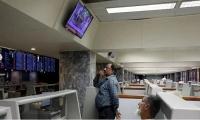Assange’s blood. This is also the Empire caught with its trousers down, and the sight is not very seemly.
The old Soviet Union had its uses. It kept the Empire in check and gave the world a kind of equilibrium in which the US, for all its power and economic clout, could not do as it pleased. Every move on the international chessboard had to be carefully weighed against any likely riposte or reaction from the Soviet bloc.
When that old curmudgeon of a foreign minister, Andrei Gromyko, who was foreign minister forever, spoke, his words were not dismissed out of hand. They were carefully analysed for their meaning and hidden nuance. The science of Kremlinology – trying to divine what was going on in the minds of the Soviet leadership – was very much in vogue, and held in high respect, the US sending its sharpest diplomats to Moscow.
The fall of the Berlin Wall and the subsequent downfall of the Soviet Empire utterly changed this balance of power and created a dangerous disequilibrium, with the US as the unchallenged master of the universe. Or so it seemed at the time until George Bush and his band of neo-con crusaders came along and plunged the US into two unthinking wars – in Afghanistan and then, in an adventure that can only be explained in surrealistic terms, Iraq.
The end of the Soviet Union created the myth of unchallenged American omnipotence. The killing fields of Iraq, and now the Taliban theatre of war in Afghanistan – followed of course by the great financial meltdown of 2009 – have defined the limits of American power. When a Gibbon sits down to ponder over the decline of the American empire – not its fall, alas, that not being imminent – Iraq no doubt will figure greatly in the narrative.
Jihad is a universal concept, its meaning so vast and profound that it cannot be straitjacketed into a single doctrine. Holding to the truth and speaking it before tyranny, regardless of the consequences, is the highest form of jihad, indeed the only jihad which has any meaning in contemporaneous times. Martin Luther King was a jihadist. In the climate of his times it took great courage to take on the prejudices of powerful sections of American opinion and lead the civil rights movement. But he had that courage and paid the ultimate price for it with his life. If he had been alive today he would have been one of Assange’s strongest defenders.
The United States is a strange country. It has some of the most pigheaded people it is possible to encounter anywhere on the planet, rightwing opinion in America inviting comparisons with any fascist ideology. Nazi storm troopers would have sympathised with American neo-conservatism. Hitler sought ‘living space’ for Germany in Russia. Bush’s Iraq war was meant as a prelude to the reshaping of the entire Middle East. The analogy may be farfetched but there is a common thread in it: the quest for conquest.
Yet the US is also home to some of the greatest debunkers of this same ideology. This is what makes the US not just a melting-pot of people but a melting-pot of ideas – the most pigheaded breathing the same air as the most enlightened. Noam Chomsky and Sarah Palin, Martin Luther King and the Ku Klux Klan, Marlon Brando and Ronald Reagan, the Vietnam War and the anti-war movement...the contrasts are endless.
In a conference in Qatar in Dec 2003, paid for by the Emir of Qatar and sponsored by the Brookings Institution, I said that whereas there was Osama bin Laden in our part of the world, the US was not without its own Osama bin Ladens. The third worlders present cheered – not all but certainly quite a few – while the American organisers – a former American ambassador to Israel and prominent Democratic think-tanker, Martin Indyck, I remember, being one of them – went red in the face.
Those were the days of Iraq orthodoxy – the iron belief that the US would of course prevail. The realisation that the expected cakewalk had turned into a bitter quagmire came a bit later, although it was evident even in those early days that the Iraqi people hadn’t exactly lined up with garlands in their hands to welcome their American occupiers.
Wikileaks has lived up to its billing. It had set itself up as the spiller of governmental secrets and that is exactly what it has done. This may not be freedom of speech but it is certainly freedom of information. Governments have every right to protect their secrets but whistleblowers – especially those who set themselves up as such – have every right to expose those secrets, more so when conducive to the public good.
Take our own case. The cables relating to Pakistan have enhanced our understanding of US-Pakistan relations. Things that we had always suspected, of whose general outline we had a fair or hazy idea, stand revealed in all their naked glory. Our leaders don’t stand exposed, in the full meaning of this term. We had never taken any of the heroes of these cables as saints or mahatmas. But we have gained some more insights into their thinking. This is a service to the Pakistani people.
No secret agents have been exposed. A list of Pakistanis on the CIA’s payroll has not been published. No dark stories of espionage or assassination have emerged. Only our understanding of certain things has been enhanced. We should be grateful to Wikileaks for this.
This is not an age exactly brimming with heroes. Its hallmarks are lies, deceit and wars waged on false premises. Idealism hasn’t died but it takes an effort to discover traces of it. Against this background Assange’s audacity comes as a breath of fresh air.
We don’t how his ordeal will end. The US will do all in its power to silence him and dismantle his website. But even if Assange has done nothing else, he has captured the world’s imagination. David and Goliath… should there be any doubts as to whose side we should be on?
Email: winlust@yahoo.com
According to Chanakya, secret of strong nation lies in ability to protect its citizens
Rapid economic progress was made possible under Modi's leadership if not ‘Modi's guarantee’
Pakistan was considered water-abundant country, with per capita water availability being 5650 cubic meters in 1951
Shrine of Mian Mir.—TheNews/FileMy history professor once referred to a theory that says the developmental telos of...
If Pakistan does not take prompt and decisive action, it could find itself at forefront of world's first water conflict
Please note that dam survey team from World Bank had proposed building of this dam in 1955







